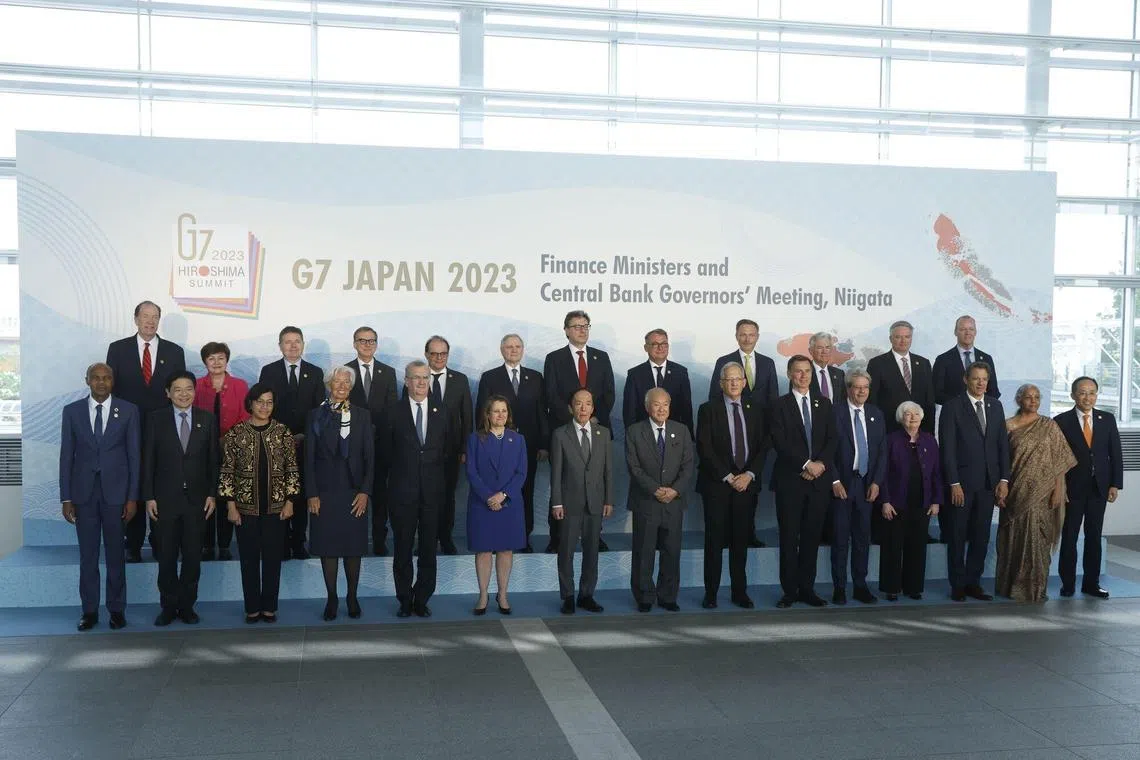G-7 finance chiefs fret over threat of greater economic uncertainty at end of meeting in Japan
Sign up now: Get insights on Asia's fast-moving developments

In a rare move, Japan had invited the finance chiefs of six non G-7 countries, including Singapore. DPM and Finance Minister Lawrence Wong (front row, second from left) was Singapore’s representative.
PHOTO: BLOOMBERG
NIIGATA, Japan – Finance chiefs from the Group of Seven (G-7) bloc of wealthy industrialised nations on Saturday warned of the threat of greater economic uncertainty as they wrapped up three days of meetings.
In their communique, they cited reasons such as Russia’s continuing invasion of Ukraine and surging inflation worldwide as clouding the global outlook.
“We need to remain vigilant and stay agile and flexible in our macroeconomic policy amid heightened uncertainty about the global economic outlook,” the finance ministers said, although they added that the global financial system remained resilient.
While this was not cited in the 14-page statement issued at the close of the finance ministers and central bank governors’ meeting, the threat of a default by the United States as early as June 1 if Washington fails to raise its debt ceiling had also loomed large over the meetings.
German Finance Minister Christian Lindner had urged American politicians to make a “grown-up” decision, with any default certain to wreak havoc on the global economy.
China was also not cited in the communique, although it was likewise the elephant in the room at the meeting due to its purported “economic coercion” against countries it disagrees with.
Japan is spearheading efforts to help low- and middle-income countries in the so-called Global South to diversify their supply chains in the name of energy security, as well as to address their debt vulnerabilities.
A Japanese Finance Ministry official said that the measures were not aimed at any specific country.
Still, the Organisation for Economic Cooperation and Development had said in a report that China had surpassed G-7 countries in its ability to manufacture critical products necessary for tackling climate change, including wind turbines, solar panels and batteries.
The statement said the ministers recognised “the urgent need to address existing vulnerabilities within the highly concentrated supply chains of important products for clean energy”.
“Diversification of supply chains can contribute to safeguarding energy security and help us to maintain macroeconomic stability,” the statement said.
A so-called Partnership for Rise (Resilient and Inclusive Supply-chain Enhancement), being developed with interested countries in collaboration with the World Bank, is targeted to be launched by the end of 2023.
“Through mutually beneficial cooperation by combining finance, knowledge and partnerships, Rise aims to support low- and middle-income countries in playing bigger roles in the midstream and downstream in supply chains of clean energy products,” the communique said.
Japanese Finance Minister Shunichi Suzuki told a news conference that Rise could enable weaker countries to “play a bigger role in supply chains” to make their industries more sophisticated, and hence contribute to global sustainable development.
“Through the pandemic, we have learnt that supply chains have tended to depend on a limited number of countries – or a single country,” he said. “In terms of economic security, it will be to the global benefit if we can ensure that critical products can be provided broadly and stably by middle- to low-income countries taking on a bigger role.”
Dr John Beirne, vice-chair of research at the Asian Development Bank Institute, told The Straits Times that the Partnership for Rise programme, while ambitious, was a positive step because the involvement of developing economies is crucial in strengthening supply chains.
He said: “Involving more economies in the global supply chain can help them move up in the value chain, thus promoting more inclusive growth.”
The meetings in the coastal central Japanese city of Niigata are a prelude to the G-7 Leaders’ Summit in Hiroshima from May 19 to 21, where China’s assertiveness and Russia’s invasion of Ukraine are set to dominate the agenda.
The G-7 comprises Britain, Canada, France, Germany, Italy, Japan and the US. The European Union is a “non-enumerated” member without the right to the rotating presidency.
In a rare move, Japan had invited the finance chiefs of six other countries – Brazil, Comoros, India, Indonesia, Singapore and South Korea – to attend the Niigata meeting. Deputy Prime Minister and Finance Minister Lawrence Wong was Singapore’s representative.
The communique said that the G-7 finance chiefs “highly valued the productive dialogue” in which views were exchanged on “recent global economic developments and major challenges to foster robust and sustainable growth”.
It added that the countries had “committed to jointly tackle a range of global economic challenges, fight poverty, and achieve strong, sustainable, balanced and inclusive global growth”.
On Russia’s invasion of Ukraine, the finance chiefs pledged unwavering support for the war-torn country “for as long as it takes”.
They condemned the “illegal, unjustifiable and unprovoked war of aggression” against Ukraine as they reiterated the need to bolster sanctions and close third-party loopholes to undermine Moscow’s ability to wage war.
The war and Russia’s weaponisation of food and energy, they said, were to be blamed for global economic hardships that are disproportionately felt by low- and middle-income countries and vulnerable groups.
Among other things, the war has added to inflationary pressures, disrupted supply chains and heightened energy and food insecurity.
“In this context, we steadfastly reject Russia’s repeated false narrative about the spillover effects of our sanctions on food and energy security,” they said.
Addressing growing income disparities both within G-7 nations and around the world, the communique said that fiscal policy should be used to provide, where appropriate, “temporary and targeted support to vulnerable groups suffering from the increase in cost of living”.
Fiscal policy should also be used to catalyse investment needed for green and digital transformation.
The finance chiefs also vowed to tighten measures against money laundering, which has been said to finance Russia’s war and North Korea’s missile and nuclear development.



